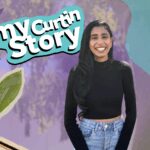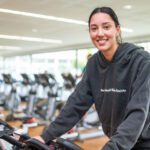Meet Pablo, a Master of Environment and Climate Emergency student, who journeyed from Chile to Australia to study his passion. Pablo’s academic journey has been filled with challenges, learning experiences, and inspiring moments of growth.
Originally from Chile, Pablo’s educational background is rooted in environmental engineering, which he says is more aligned with what Curtin students would call a Bachelor of Environmental Science. From early on, Pablo knew he wanted to pursue further education, especially in an area like climate change that would allow him to specialise in sustainability. However, pursuing a master’s degree in Chile proved difficult due to high costs. “When I compared the fees between my country and here, I realised they were quite similar. So, I made the decision to come to Australia—not just for the education, but for the experience of living abroad as well.”
This decision wasn’t made lightly. Uprooting his life meant moving his family—his wife and young daughter—from Chile to Australia, a significant challenge in itself. Pablo had studied English, so felt he could manage the language barrier, but his family found it challenging at the beginning. It wasn’t just the language, but also the cultural shift, yet over time, however, his family adapted, expanding their social circles and gradually feeling more settled in Perth.
Pablo’s transition to the Australian education system presented unique challenges. In Chile, education was more structured, focusing on exams, while in Australia, the emphasis was on self-directed learning and research. “Here, professors give you a lot of freedom to guide your own learning. At first, that was hard for me because I wasn’t used to it,” he admits. “You have to manage your time, be responsible, and set your own goals because no one’s going to chase after you. It’s up to you to get the work done.” Studying alongside classmates from over 25 countries broadened his perspective, though navigating different learning styles took some adjustment. Despite these initial hurdles, Pablo thrived in his master’s program. One of the subjects that captured his interest the most was circular economy, a sustainable model focused on reusing and recycling resources to minimise waste. Whilst studying, he has had the opportunity to work on projects related to zero waste management systems, and has begun applying those same principles at home by composting organic waste and teaching his daughter about recycling.
Pablo’s academic achievements didn’t go unnoticed. He was offered a position as a research assistant at Curtin’s Faculty of Humanities, where he’s been working closely with professors on environmental projects. “I really enjoy research, so this role has been an incredible opportunity for me. It’s also helping me build the foundation I need for my future goals.” Pablo hopes to pursue a PhD, ideally in circular economy or carbon-neutral technologies. He loves academia, teaching and research and believes that may be his path in life, but he recognises the need to build up his academic portfolio by publishing more research papers to be competitive in post grad scholarships.
While Pablo is passionate about the environmental field, he’s also aware of the complex challenges that lie ahead. He sees similarities in Chile and Australia, whereby he notices how economic interests in industries like mining play a significant role in shaping environmental policy. “Australia is striving to move toward a carbon-neutral future, but the economy is still very much tied to industries like mining. It’s a difficult transition, but one that is necessary.”
As he looks to the future, Pablo remains optimistic. He notices how environmental science is such a broad field, but believes the world needs more specialists. His advice to other students would be to ‘find your niche, your passion, and focus on becoming an expert in that area’. Pablo says to:
“be consistent, be responsible, be organised, set your own goals, your own targets”.
For Pablo, the road to a sustainable future is both personal and professional. His dedication is a testament to his passion for environmental sustainability and his determination to make a global impact. With a passion for circular economy and a drive to make meaningful contributions in the environmental space, his journey is just beginning.



